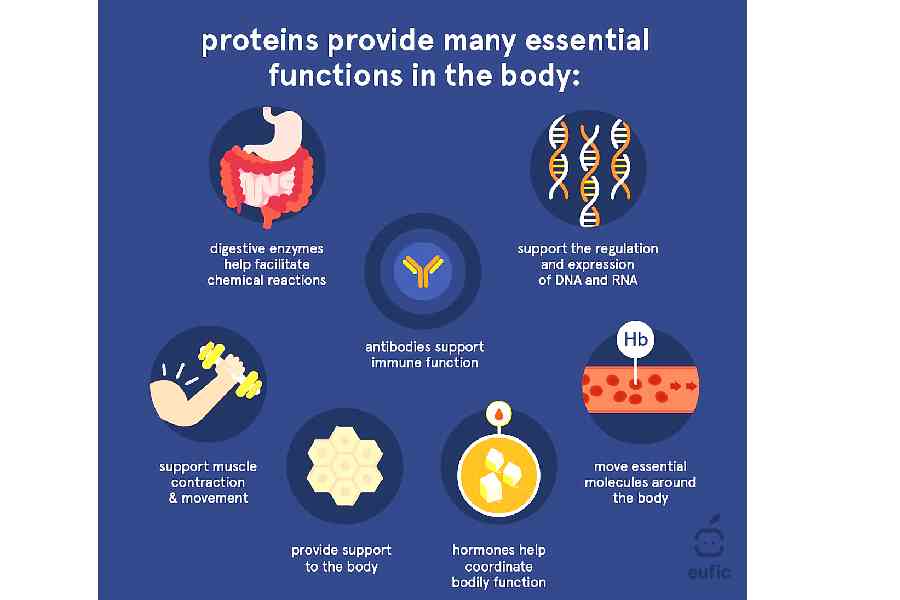In the grand tapestry of existence, there is one fundamental element that stands above all others, radiating profound importance — protein. Its name, derived from the Greek word “protos”, meaning “first” or “foremost”, signifies the pivotal role it plays in our lives. Protein is not merely a component of life, it is the very essence of it.
Found in every living organism on Earth, protein is an indispensable component of the human body, forming the structural and functional basis of muscles, skin, hair, bones and virtually every other tissue and body part. Its significance extends far beyond mere physicality; protein is essential for proper muscle development and function, bone health, connective tissue strength, tissue repair and growth, blood oxygenation, and even the most basic activities within our cells.
At the core of protein lies a remarkable mosaic of building blocks known as amino acids. These molecular wonders, often referred to as the “building blocks of life”, intricately combine to form the complex structures that define proteins. However, the human body, with all its intricate machinery, cannot produce all the essential amino acids required for optimal functioning. Consequently, we must obtain protein from our daily diet, ensuring a steady supply to support the intricate processes that keep us alive and thriving.
THE DAILY DOSE
The World Health Organization (WHO) has established the Safe Level of Protein (SLP) intake at 0.83g per kilogram of body weight per day, a guideline expected to meet the protein needs of 97.5 per cent of the world’s healthy adult population. Specific recommendations vary based on individual body weight, but as a general benchmark, adult women should consume around 46g of protein per day, while adult men should aim for approximately 56g.
These numbers, however, serve as a starting point for discussion rather than definitive guidelines. The International Protein Board (IPB), a consortium of protein experts from diverse continents, has expressed mixed opinions about the adequacy of current protein intake recommendations, underscoring the need for a global dialogue regarding protein methodologies and requirements.

Protein smoothies can be power-packed meals that are convenient to have and tasty too
NOT A ONE-SIZE-FITS-ALL FORMULA
The challenge lies in meeting daily protein requirements solely through food, particularly for those following vegetarian or vegan diets, which eschew animal-derived protein sources. While meats, eggs and fish are considered “complete proteins” due to their inclusion of all nine essential amino acids, not all plant-based protein sources offer the same completeness.
Legumes, lentils, whole grains and beans serve as excellent sources of plant-based protein, but none of them have all the essential amino acids. Vegetarians and vegans often resort to combining pulses and cereals to achieve a more balanced amino acid profile. However, even with meticulous dietary planning, the quantity of essential amino acids in plant-based protein sources may still fall short.
For individuals adhering to vegetarian or vegan diets, protein supplements prove invaluable as a complete and balanced protein source. These supplements offer a convenient and efficient means of augmenting protein intake while overcoming the limitations of certain plant-based sources.
It is important, however, to exercise caution when selecting protein supplements, ensuring they are of high quality and free from added sugars, trans fats and refined oils. Scrutinising labels and understanding the ingredients is vital for making informed choices.
DEBUNKING MYTHS ABOUT PROTEIN SUPPLEMENTS
In the realm of nutrition and fitness, myths and misconceptions often surround protein supplements. It’s important to separate fact from fiction to make informed decisions about incorporating these supplements into our diet. Let’s debunk some common myths and shed light on the truth surrounding protein supplements.
Myth 1: Protein Supplements Are Only for Bodybuilders
Fact: While protein supplements are popular among athletes and bodybuilders, they are beneficial for individuals with various lifestyles and goals. Protein is essential for everyone, regardless of their level of physical activity. It supports muscle maintenance, tissue repair, and overall health. Protein supplements can be used by anyone looking to meet their protein requirements conveniently and efficiently, including those who engage in regular exercise, individuals with specific dietary needs, or the elderly seeking to maintain muscle mass.
Myth 2: Protein Supplements Cause Kidney Damage
Fact: This is a prevalent myth that has been debunked by scientific research. Protein supplements do not pose a risk to kidney health in healthy individuals. However, individuals with pre-existing kidney

conditions should consult their healthcare provider before significantly increasing protein intake. If protein supplements were genuinely harmful, bodybuilders would universally experience adverse effects, which is far from reality. Kidney problems primarily arise from factors such as diabetes, high blood pressure, overuse of steroids and other medications, infections, and the consumption of processed foods laden with high levels of sugar. It is crucial to differentiate between the potential side effects of a high-sugar, high-trans-fat diet and the responsible use of protein supplements.
Myth 3: Protein Supplements Make Women Bulky
Fact: This myth is particularly misleading. Protein supplements, on their own, do not cause bulky muscles in women. Muscle hypertrophy, or significant muscle growth, is a complex process that involves a combination of intense training, specific nutrition, and hormonal factors. Women have naturally lower levels of testosterone, which limits the potential for extreme muscle growth. Protein supplements, when consumed as part of a balanced diet and combined with appropriate exercise, can support lean muscle development and toning in women, helping them achieve their fitness goals without the fear of becoming overly muscular.
Myth 4: Protein Supplements Are Unregulated and Unsafe
Fact: Protein supplements, like other dietary supplements, are regulated by government agencies, such as the Food Safety and Standards Authority of India (FSSAI), Food and Drug Administration (FDA) in the US or the European Food Safety Authority (EFSA) in Europe. These agencies have established guidelines and quality standards for manufacturing and labelling these products.
Myth 5: Protein Supplements Are a Replacement for Whole Foods
Fact: While protein supplements can be a convenient way to supplement protein intake, they should not replace whole, nutrient-dense foods in a well-rounded diet. Whole foods provide a wide range of vitamins, minerals, fibre, and other beneficial compounds that are necessary for optimal health. Protein supplements should be seen as a complementary addition to a balanced diet, especially for individuals who may struggle to meet their protein requirements through regular meals alone.
By dispelling these myths, we can make informed decisions about incorporating protein supplements into our dietary choices. Protein supplements, when used appropriately and in conjunction with a well-balanced diet, can be a valuable tool to support our overall health, fitness goals, and lifestyle needs.
CONVENIENCE AND BENEFITS OF PROTEIN SUPPLEMENTS
Protein supplements have emerged as a valuable ally for individuals across various life stages and circumstances. They offer unparalleled convenience and a range of benefits, particularly for the elderly, those seeking easy digestibility, and individuals facing increased demands during periods of stress. Let’s delve into these aspects further.
Elderly Nutrition: Ageing presents unique challenges when it comes to meeting nutritional needs. As we age, our bodies undergo physiological changes that can impact appetite, digestion, and overall nutrient absorption. The elderly often find it challenging to consume adequate amounts of protein through whole foods alone, making protein supplements a practical solution. These supplements provide a concentrated source of high-quality protein, which is easily digested and absorbed, ensuring that older adults receive the necessary nutrients to support muscle health, immune function, and overall vitality.
Easy Digestibility: Protein supplements are designed to offer superior digestibility, making them an attractive option for those with sensitive digestive systems or underlying gastrointestinal issues. High-quality protein supplements often utilise protein sources that are pre-digested or broken down into smaller peptides, facilitating easier absorption and reducing the potential for digestive discomfort. This characteristic is particularly beneficial for individuals with conditions such as irritable bowel syndrome (IBS) or lactose intolerance, who may struggle to obtain adequate protein from traditional food sources.
Meeting Increased Demands during Periods of Stress: Stress, whether physical or emotional, places additional demands on the body’s nutritional requirements. During these times, such as intense physical training, recovery from illness or surgery, or dealing with high-stress situations, the body may require increased protein intake to support tissue repair, immune function, and overall recovery. Protein supplements offer a convenient and efficient way to meet these heightened demands. They provide readily available amino acids, which are the building blocks of protein, helping to support muscle recovery, enhance immune response, and aid in the overall healing process.
Time Constraints and Convenience: In today’s fast-paced world, time is often a limited resource. Many individuals find it challenging to prioritise nutritious meals that adequately meet their protein requirements. Protein supplements serve as a time-saving option, offering a quick and convenient solution for busy individuals on the go. With a simple shake or snack, protein supplements can provide a concentrated dose of high-quality protein, ensuring that nutritional needs are met even amidst hectic schedules. This accessibility allows individuals to bridge the gap between their protein requirements and their daily dietary intake, promoting overall health and well-being.
However, it is important to note that while protein supplements offer convenience and benefits, they should not replace a balanced diet based on whole foods. Whole foods provide a diverse array of nutrients, including vitamins, minerals, and dietary fibre, which are essential for optimal health. Protein supplements should be used as a supplement to, rather than a replacement for, a well-rounded diet.
TYPES OF PROTEIN SUPPLEMENTS
The market is replete with various types of protein supplements, each catering to specific dietary preferences, nutritional needs, and fitness goals. Understanding the different types can help individuals select the most suitable option to meet their specific requirements. Here are some common types of protein supplements and how they can address different needs.
Whey Protein: Whey protein is derived from milk and is one of the most popular and widely available protein supplements. It is known for its high biological value, meaning it contains all essential amino acids required by the body. Whey protein is rapidly absorbed and digested, making it ideal for post-workout recovery and muscle building. It is available in three forms: whey concentrate, whey isolate, and whey hydrolysate. Whey concentrate provides a good balance of protein, carbohydrates, and fats, while whey isolate and hydrolysate offer a higher protein content with minimal carbohydrates and fats, making them suitable for individuals with lactose intolerance or those aiming for a low-carb diet.
Casein Protein: Casein protein is also derived from milk, but it is digested and absorbed at a slower rate compared to whey protein. This slow-release characteristic makes it ideal for providing a sustained release of amino acids, making it suitable for promoting muscle recovery and growth during periods of fasting or prolonged periods without food, such as overnight. Casein protein is often consumed before bed to support muscle repair and prevent muscle breakdown during sleep.
Plant-based Protein: Plant-based protein supplements have gained popularity among vegetarians, vegans, and individuals with lactose intolerance or dairy allergies. They are derived from plant sources such as peas, rice, soy, hemp, or a combination of these. Plant-based protein supplements offer a complete or complementary amino acid profile, providing all the essential amino acids needed by the body. These supplements are suitable for those looking for a vegan or vegetarian protein source and can be easily incorporated into their dietary regimen.
Collagen Protein: Collagen protein supplements have gained traction due to their potential benefits for skin, hair, joint health, and connective tissues. Collagen is the most abundant protein in the body and provides structural support. These supplements are typically sourced from animal products, such as bovine or marine collagen. Collagen protein supplements are often used to support skin elasticity, promote joint health, and aid in tissue repair.
Blended Protein: Blended protein supplements combine different protein sources to provide a more comprehensive amino acid profile. These blends often consist of a combination of whey protein, casein protein, and plant-based proteins. Blended protein supplements offer the benefits of both fast and slow-release proteins, making them suitable for various purposes, such as post-workout recovery, muscle maintenance, or general dietary supplementation.
It’s important to note that individual needs may vary based on factors such as fitness goals, dietary preferences, and any specific dietary restrictions or allergies. Consulting with a healthcare professional can help determine the most appropriate type of protein supplement based on individual requirements.
TIME TO CLEAR THE AIR!
Misconceptions and myths are daily fare in life. Most myths about protein and supplements have been passed down through the ages. It’s time to put an end to them. Let’s fight sticky myths with even stickier science. Verified and validated information should be simple to understand, grab attention and stick in the memory. This will potentially expose the fallacy that the myth uses to distort facts and, therefore, help people counter the myth with facts.
Brainstorm your beliefs, always!.

Puja Karnani Agarwal is a functional medicine practitioner, certified human performance nutritionist, and a REPS-certified Level-4 trainer. She consults at Reverra Aesthetics, 15C Hazra Road, Calcutta 700026. She is also on Instagram @pujakarnaniagarwalofficial and her website is pujakarnaniagarwal.com






